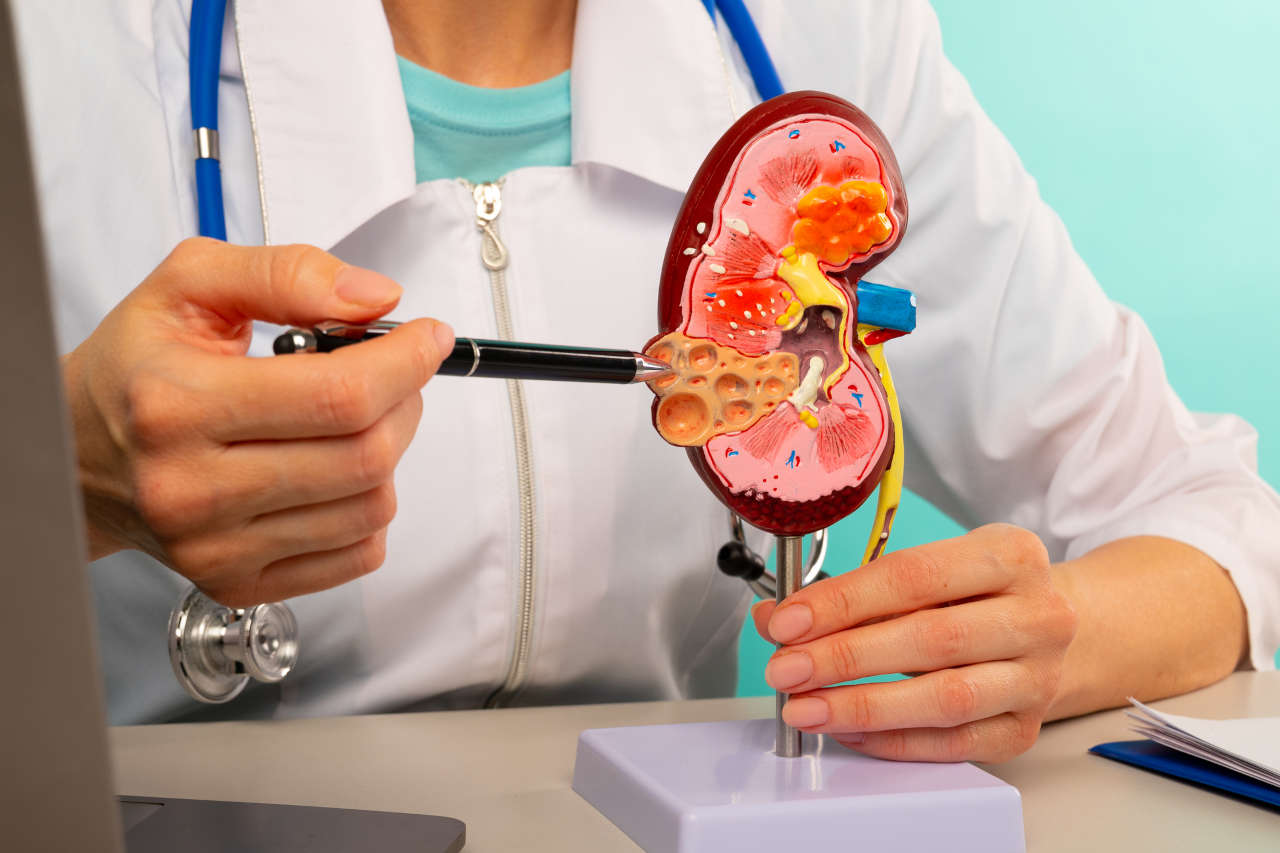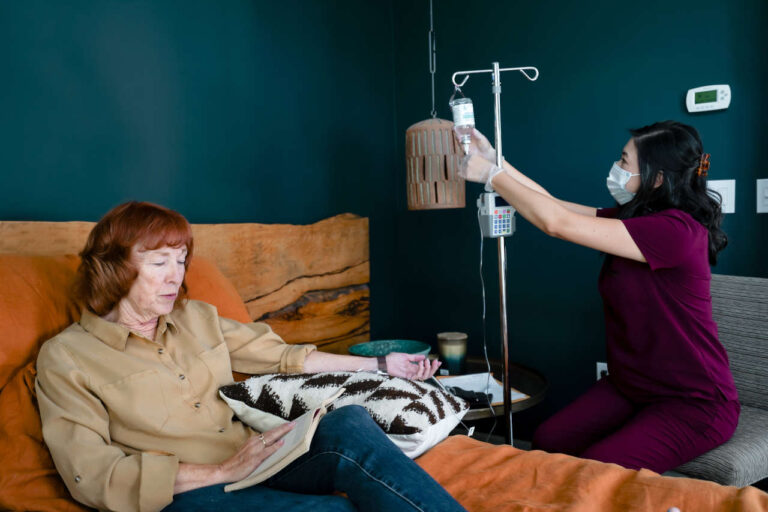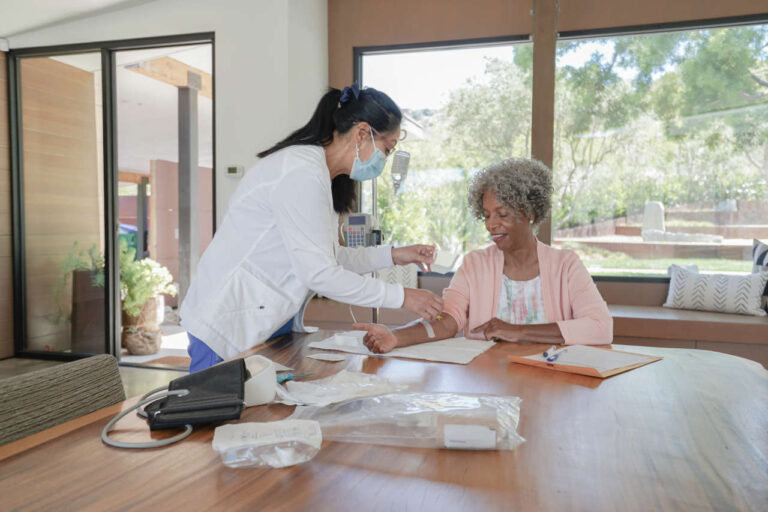
El trasplante de órgano sólido es un procedimiento quirúrgico que reemplaza el órgano dañado de una persona por uno sano de un donante. Es un procedimiento vital que puede beneficiar a quienes sufren una insuficiencia orgánica grave.
Pregunte sobre la infusión de IgIV en el hogar
Sin embargo, el trasplante de órganos sólidos presenta varios desafíos. Uno que los pacientes suelen enfrentar es el rechazo del órgano. Esto ocurre cuando el sistema inmunitario del cuerpo identifica erróneamente el nuevo órgano como un objeto extraño y dañino y lo ataca. Para prevenirlo, los médicos usan medicamentos inmunosupresores que debilitan el sistema inmunitario, pero esto también aumenta el riesgo de infección.1].
Inmunoglobulina intravenosa (IVIG) Puede ayudar a prevenir el rechazo de trasplantes. En este artículo, analizaremos la IgIV y cómo puede mejorar las probabilidades de éxito de un trasplante de órganos.
¿Qué es la IgIV?
La inmunoglobulina intravenosa (IVIG) es un tratamiento elaborado a partir del plasma de miles de donantes, que contiene diversos anticuerpos. La IVIG puede ayudarle a combatir infecciones si tiene un sistema inmunitario debilitado. Se utiliza en diversos trastornos del sistema inmunitario y enfermedades inflamatorias como... enfermedad de Kawasaki, lupus y síndrome de Guillain-Barré.
La IgIV ofrece muchos beneficios para el trasplante de órganos sólidos. La IgIV puede calmar un sistema inmunitario hiperactivo, reduciendo así la probabilidad de rechazo del órgano. Antes y después de la cirugía, debe tomar medicamentos inmunosupresores, que debilitan su sistema inmunitario. Esto lo hace más propenso a infecciones, y la IgIV puede ayudarle a combatirlas. En resumen, la IgIV puede contribuir al éxito de su trasplante y a mantenerlo más saludable.
¿Cuáles son los beneficios de la IgIV para el trasplante de órganos sólidos?
La inmunoglobulina intravenosa (IVIG) es una buena opción de tratamiento de apoyo para el trasplante de órganos sólidos. Puede desempeñar un papel vital tanto en la preparación para el trasplante de órgano como en el manejo de las posibles complicaciones posteriores. A continuación, analizaremos cómo la IVIG puede ayudarle en las diferentes etapas del trasplante de órgano.
Función de la IgIV antes del trasplante de órganos

Antes de un trasplante de órgano sólido, los médicos utilizan principalmente inmunoglobulina intravenosa (IVIG) para la desensibilización. La desensibilización es un proceso médico que reduce los anticuerpos en la sangre del paciente que podrían dañar el órgano trasplantado. Debe someterse a este proceso antes del trasplante si tiene niveles altos de aloanticuerpos, que son anticuerpos que atacan los órganos trasplantados. Cuanto mayor sea el nivel de aloanticuerpos en la sangre, mayor será el tiempo de espera antes de la cirugía.
En las últimas dos décadas, los médicos han utilizado la IgIV como herramienta para el proceso de desensibilización en el trasplante de riñón. Puede reducir los niveles de aloanticuerpos en el organismo, lo que puede aumentar la probabilidad de éxito de un trasplante de órgano.2][5]. Para el proceso de desensibilización, los médicos utilizan IgIV sola o en combinación con otros tratamientos como esteroides, intercambio de plasma y medicamentos inmunosupresores como rituximab [3][5].
La mayor parte del éxito documentado de la IgIV en el proceso de desensibilización se ha registrado en trasplantes de riñón. Según un estudio, no existe evidencia que respalde el uso de la IgIV para el proceso de desensibilización en trasplantes de corazón, pulmón e hígado.5]. Sin embargo, un estudio canadiense reciente sugirió que el uso combinado de IgIV, intercambio de plasma, globulina antitimocítica y ácido micofenólico puede beneficiar a los pacientes que tienen altos niveles de aloanticuerpos durante los trasplantes de pulmón [4].
Obtenga asistencia para el copago de IgIV
Función de la IgIV después del trasplante de órganos
Tras el trasplante de órgano, la principal preocupación es prevenir el rechazo. Es posible que experimente rechazo durante los primeros meses o después de un tiempo prolongado. El rechazo puede estar causado por células o anticuerpos. Si los anticuerpos causan el rechazo, se denomina rechazo mediado por anticuerpos (RAM). Si los médicos sospechan RAM, le aplicarán un tratamiento para suprimir su sistema inmunitario y salvar el órgano trasplantado.
Diversos estudios realizados en las últimas décadas han demostrado que el uso de IgIV en combinación con medicamentos como el rituximab puede reducir el riesgo de rechazo de órganos en trasplantes de riñón [7][8]. También es beneficioso en el tratamiento de la RAM en otros trasplantes como pulmón, corazón e hígado.9].
Existe otra complicación importante que se presenta después del trasplante de órgano. Muchos pacientes experimentan niveles bajos de inmunoglobulinas debido al uso de inmunosupresores [10Esto puede aumentar la propensión a las infecciones. En este caso, la terapia con IgIV puede ayudar a reponer los niveles de inmunoglobulina y proteger contra infecciones. Según un estudio, el uso de IgIV puede reducir el riesgo de contraer infecciones después de un trasplante de órgano.11].
El resultado final
Durante más de una década, la IgIV ha sido muy útil en el trasplante de órganos sólidos. Puede garantizar la supervivencia a largo plazo del receptor de un trasplante al reducir los niveles de aloanticuerpos, prevenir la resistencia a los antimicrobianos (RAM) y controlar las infecciones. Sin embargo, aún se necesita más investigación para comprender todo el potencial de la IgIV para el trasplante de órganos sólidos.
REFERENCIAS:
- Black, CK, Termanini, KM, Aguirre, O., Hawksworth, JS y Sosin, M. (2018). Trasplante de órganos sólidos en el siglo XXI. Anales de Medicina Traslacional, 6(20), 409. https://doi.org/10.21037/atm.2018.09.68
- Sethi, S., Choi, J., Toyoda, M., Vo, A., Peng, A. y Jordan, SC (2017). Desensibilización: superando las barreras inmunológicas para el trasplante. Journal of Immunology Research, 2017, 1–11. https://doi.org/10.1155/2017/6804678
- Guo, Z., Zhao, D., Sa, R., Wang, L., Li, S., Zhao, G., Zhu, L. y Chen, G. (2023). Un régimen perioperatorio modificado para el trasplante renal de donante fallecido en receptores presensibilizados sin terapia de desensibilización previa. Frontiers in Immunology, 14. https://doi.org/10.3389/fimmu.2023.1223567
- Tinckam, K., Keshavjee, S., Chaparro, C., Barth, D., Azad, S., Binnie, M., Chow, C., De Perrot, M., Pierre, A., Waddell, T., Yasufuku, K., Cypel, M. y Singer, L. (2015). Supervivencia en receptores de trasplante de pulmón sensibilizados con desensibilización perioperatoria. American Journal of Transplantation, 15(2), 417–426. https://doi.org/10.1111/ajt.13076
- Shehata, N., Palda, VA, Meyer, RM, Blydt-Hansen, TD, Campbell, P., Cardella, C., Martin, S., Nickerson, P., Peltekian, K., Ross, H., Waddell, T.K., West, L., Anderson, D., Freedman, J. y Hume, H. (2009). El uso de inmunoglobulina en pacientes sometidos a trasplante de órganos sólidos: Guía de práctica basada en la evidencia. Transfusion Medicine Reviews, 24, S7–S27. https://doi.org/10.1016/j.tmrv.2009.09.010
- Jordan, SC, Tyan, D., Stablein, D., McIntosh, M., Rose, S., Vo, A., Toyoda, M., Davis, C., Shapiro, R., Adey, D., Milliner, D., Graff, R., Steiner, R., Ciancio, G., Sahney, S. y Light, J. (2004). Evaluación de la inmunoglobulina intravenosa como agente para reducir la alosensibilización y mejorar el trasplante en pacientes adultos altamente sensibilizados con enfermedad renal terminal. Revista de la Sociedad Americana de Nefrología, 15(12), 3256–3262. https://doi.org/10.1097/01.asn.0000145878.92906.9f
- Lachmann, N., Duerr, M., Schönemann, C., Pruß, A., Budde, K. y Waiser, J. (2017). Tratamiento del rechazo de aloinjerto renal mediado por anticuerpos: Mejora gradual. Journal of Immunology Research, 2017, 1–9. https://doi.org/10.1155/2017/6872046
- Takemoto, SK, Zeevi, A., Feng, S., Colvin, RB, Jordan, S., Kobashigawa, J., Kupiec-Weglinski, J., Matas, A., Montgomery, RA, Nickerson, P., Platt, J.L., Rabb, H., Thistlethwaite, R., Tyan, D. y Delmonico, FL (2004). Conferencia Nacional para la Evaluación del Rechazo Mediado por Anticuerpos en el Trasplante de Órganos Sólidos. American Journal of Transplantation, 4(7), 1033–1041. https://doi.org/10.1111/j.1600-6143.2004.00500.x
- Gobernanza de Ig: Criterios para el uso clínico de inmunoglobulinas en Australia. (sin fecha). https://www.criteria.blood.gov.au/MedicalCondition/View/2484
- Works CitedPerez, Elena E., et al. “Update on the Use of Immunoglobulin in Human Disease: A Review of Evidence.” Journal of Allergy and Clinical Immunology, vol. 139, no. 3, Mar. 2017, pp. S1–S46, www.aaaai.org/Aaaai/media/MediaLibrary/PDF%20Documents/Practice%20and%20Parameters/IVIG-March-2017.pdf, https://doi.org/10.1016/j.jaci.2016.09.023.
- Carbone, J., Fernández-Yáñez, J., Montanchez, J., Zatarain, E., Navarro, J., Rodríguez-Ferrero, M., Anaya, F., Salcedo, M., Fernández, A., Muñoz, P., Valerio, M. y Sarmiento, E. (2018). Terapia de reemplazo de inmunoglobulina intravenosa en el trasplante de órganos sólidos con infecciones graves y deficiencia secundaria de anticuerpos. Trasplante, 102 (Suplemento 7), S84. https://doi.org/10.1097/01.tp.0000542670.27264.65













